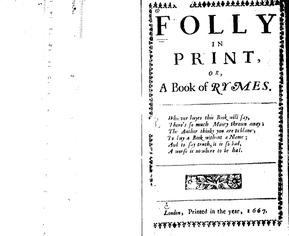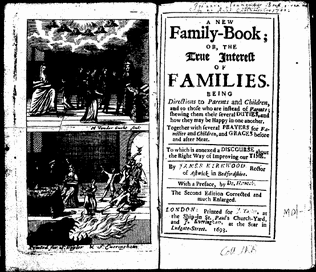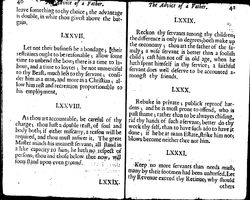 Folly in Print, (London, 1667) Wing / 436:03 Folly in Print, (London, 1667) Wing / 436:03 I had to laugh when I came across this tract by John Raymond, 17th century author of Folly in Print, or A Book of Rymes (1667). Right away, on the first page, he lets the readers know it really isn't his fault if you don't like his book: "Whoever buyes this Book will say, Next, Raymond then explains to his readers that if they believe what the bookseller says (or sings, as was often the case), it's their own fault if they find they don't like the book after all. "... in Books, where for money or exchange, we take our choice, and in our own Election please our selves; Can you imagine if authors could still add this type of caveat emptor today? Madness! But I'm sure there are many authors today--especially those stung by hurtful reviews--who might wish they could say something like this to their readers: I doe not promise for my Book nor say 'tis good, but here's variety and each man (of his own pallat) is the certain judge: You might like my book, you might not. To each her own!
But what do you think? Have you ever felt deceived about a book?
9 Comments
 In seventeenth-century England, the role of servants was far more nuanced and flexible than readers today may realize. Certainly, there was a long-standing patriarchal expectation that the head of a family would maintain a godly and dutiful order over his household. In advice manuals, published letters and sermons, men were repeatedly admonished on how to treat the servants living in their homes. Men were expected to provide food, shelter, religious instruction, and a disciplined hand, much as they were expected to treat their own children and wives. They were not supposed to treat their servants as slaves; indeed, quite the opposite. However, we must always consider the tensions between prescription and practice. Just because the expectations were stated, most certainly does not mean that the expectations were met. For example, in Advice of a father, or, Counsel to a child (1664), men were admonished to:
For this reason, as the last injunction suggests, discretion was particularly important (perhaps because it was not always be realized). The Early English Books are full of tales of servants blackmailing their employers, because they had discovered something the master (or mistress!) would rather have kept hidden (e.g. adultery, gambling debts, infanticide etc). Thus, the same advice manual warns:
This last point suggests that even the lowest servant in his employ should be treated as all the other servants were treated.While the master was expected to rule with a firm hand, he was more like a benevolent monarch than a tyrant:
There's a pragmatic realization here that seems to transcend the ages. If you work someone without letting them "blow off steam," then you run the risk of having unmotivated, even hostile or violent, servants in your household. This holds with the reality of homicide trends in the 17th century: Far more servants killed their masters, than masters killed their servants! This injunction also fits in with the many accounts across the Early English books of servants getting some days off, attending the theatres and fairs, going to market, visiting family, even sharing in merriments with the family. While the author of this piece would mostly likely call for moderation, it's clear that masters did give their servants more freedoms than might be assumed.  Anon. (1664). Advice of a father Anon. (1664). Advice of a father I want to point out one other piece of advice offered in this manual: "Reckon thy servants among thy children; the difference is only in degrees; both make up the economy; thou art the father of the family; a wife servant is better than a foolish child; cast him not off in an old age, when he has spent himself in thy service; a faithful servant does well deserve to be counted among thy friends." There was, without a doubt, a recognition that loyal servants could become more like members of the family over time. In this particular injunction, the master is told not to throw out his servants just because they have become old, but rather to take care of them. The best example I can think of, to help illustrate how a servant could become like a family member over time, is to draw on a 1960s reference: Would the Brady Bunch have thrown out Alice? In my recent novel, A Murder at Rosamund's Gate, I touch on a lot of these issues. I deliberately placed my protagonist Lucy Campion, in the household of a magistrate, at a time when Enlightened principles were starting to emerge in England. In my story, I deliberately juxtapose the reasoned household of the magistrate, with the less disciplined households that surrounded them. I wanted my magistrate then to be a more Enlightened thinker, more concerned with ideas, than the person who suggested those ideas to him. So he could have listened to and believed in the views of a servant with an intelligent lively mind. Perhaps I gave Lucy too many freedoms, perhaps I didn't. Ultimately, I do not think there is any blanket, all-encompassing way to look at the relationship between masters and servants in 17th century England. Arguably, these attitudes may have changed in the 18th and 19th century (although I doubt there was a monolithic understanding of this relationship even then), but the bottom line is this: The relationship between master and servant in the 17th century was far more nuanced and flexible than is often assumed. This is my story, and I'm sticking to it! |
Susanna CalkinsHistorian. Mystery writer. Researcher. Teacher. Occasional blogger. Categories
All
Archives
May 2023
|
 RSS Feed
RSS Feed